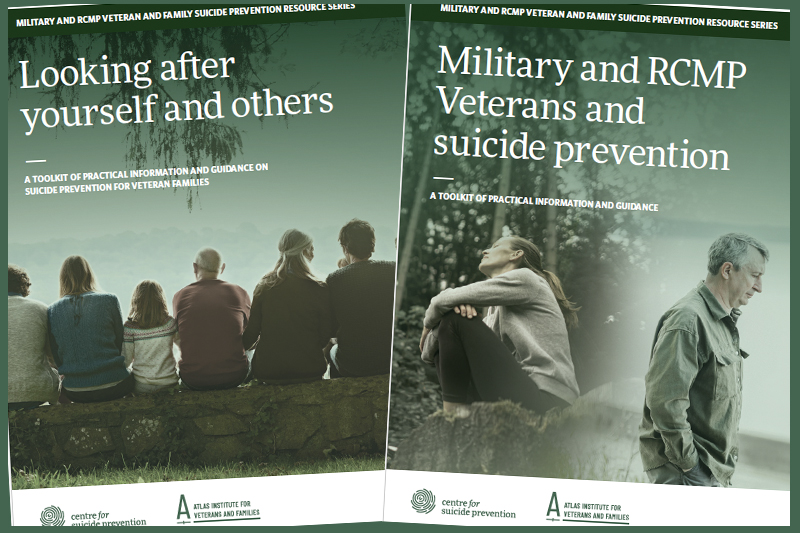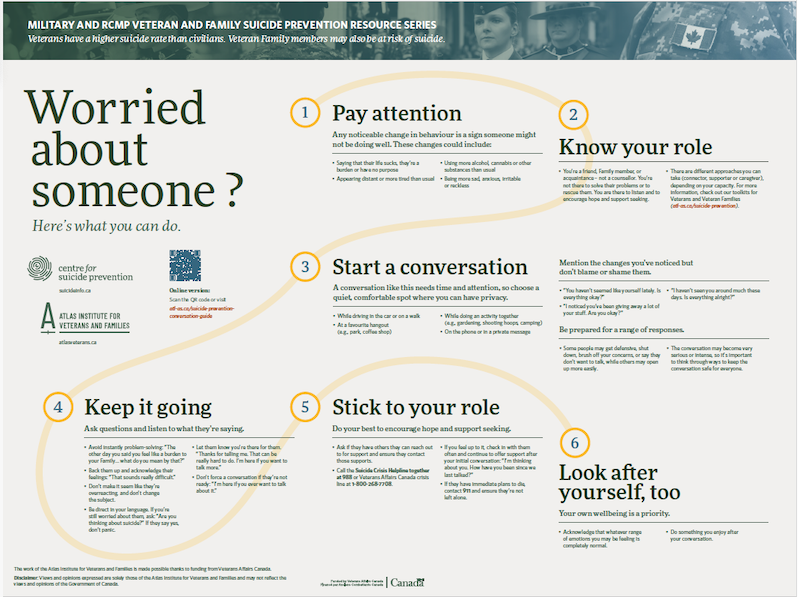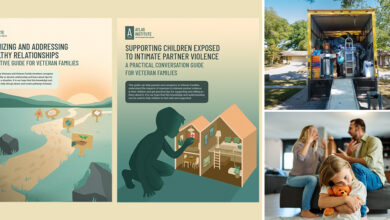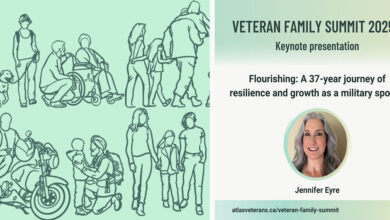Health and WellnessPrograms & Services
New Suicide Prevention Resource for Veterans and Families Released
In collaboration with Veterans and Family members and in partnership with the Centre for Suicide Prevention, the Atlas Institute for Veterans and Families released a new suite of suicide prevention resources.
The new resources were created to provide a toolkit for Veterans and their families. According to the Institute, the risk of suicide for Veterans is 1.4 to 1.9 times higher than in the general population, with women Veterans almost two times more likely to die by suicide than women in the general population.
Veterans’ Higher Risk of Dying by Suicide
“Statistics confirm that the Veteran population is at a higher risk for mental health concerns than Canadian general population, with reported rates among Veterans of 26 per cent for depression, 24 per cent for posttraumatic stress disorder (PTSD) and 21 per cent for anxiety.
“These facts support upstream strategies focused on increasing protective factors,” said Fardous Hosseiny, President and CEO of the Atlas Institute.
He added tackling the issue must include equipping Veterans and families equally with practical strategies and tools to understand and support their mental health.

New Resources Released
To support Veterans and families, the organization worked with Veterans and families, partnering with the Centre for Suicide Prevention to develop the suite of suicide prevention resources.
“Our goal was to develop the new tools to support both Veterans and their Family members, so they can find answers based on the experiences of people like them for the questions they may have about mental health and suicide, be that immediate access to resources such as direct supports, tips and strategies for loved ones or for themselves outside of the needs of their loved ones. There is a continuum of experiences for both the Veteran and the Family member, and these resources aim to acknowledge and support people’s needs at different points along that continuum,” said Laryssa Lamrock, National Strategic Advisor for Veteran Families at the Atlas Institute.
As a member of the Atlas Institute Lived Experience team, Lamrock added that because Veterans are at higher risk of mental health concerns, their loved ones can also be significantly impacted when their loved one is struggling with suicidal thoughts and behaviours.
Hosseiny noted that for Veterans and family members dealing with suicidal thoughts and behaviours in themselves and their loved ones, it can be overwhelming and challenging to know where to turn.
“While there is work to be done, these resources are an important part of a much-needed multilayered approach to suicide prevention, which can continue to grow. Our hope is to help Veterans and their Families know they are not alone and that this is a tool they can add to their toolkit to support both their own mental health and that of the person they’re caring for,” Hosseiny said.
It is critical to acknowledge that Veteran family members’ mental health is important to consider in its own right and that they may have their own challenges to address, added Lamrock.

Limited Resources Available
The Institute noted veterans and their families have long identified suicide prevention as a priority and emphasized the need for additional support for mental health and well-being.
A recent Atlas-funded study found there seem to be very few, if any, resources dedicated specifically to family members in their own right, despite the fact they have their own mental health experiences and needs and may themselves be at risk for suicide, noted Lamrock.
Brian McKenna, Veteran and national strategic advisor for Veterans at the Atlas Institute, agreed it is essential for both Veterans and family members to have suicide prevention resources that speak to their perspectives and unique needs.
“These resources have been created for and by members of the Veteran community and include toolkits for both Veterans and Family members that incorporate their specific experiences. The Veteran toolkit looks at understanding suicide in Veterans, actions to take if someone sees warning signs in themselves or loved ones, and strategies to build resilience and help reduce risk among others. The toolkits include information and tips on self-care for family members in their own right and for managing their own mental health and practical strategies to support their loved one,” said McKenna.
He added to support the resources, there is a conversation guide that works through how to talk to someone who might be experiencing suicidal thoughts and behaviours. A help card also provides key pointers and information about direct supports for Veterans in crisis.

Key Partners: Veterans and their Families
By actively engaging with Veterans and their Families as key partners, co-investigators and co-authors of its research, Atlas also includes their participation in reviewing research outcomes from a lived expertise perspective.
The Institute also collaborates and partners with Veterans and families to understand which issues matter most to them, using that knowledge to work with them and with service providers and researchers to co-create resources and knowledge products that fit the unique culture and needs of the Veteran and Family communities.
Mara Grunau, executive director of Centre for Suicide Prevention, said, “Veterans, Veteran Families and communities all have a role to play in building resilience and preventing Veteran suicide. If you’re worried about a Veteran, have an open, non-judgmental conversation. If they’re considering suicide, connect them to help.”
Resources are now available to download and print here.











